Note
Hi sorry if this is a bother but i really loved (and needed) that most about MI6, do you think you can make one about MI5 too? I've been trying to find stuff about it but can't find any information as in depth as your post :)
I’m really glad the MI6 post was helpful! And it's no bother! I'll do it gladly!
Ready to jump back into the murky world of intelligence?
Alright, so we've talked about MI6 and how it gathers intelligence to aid the UK in its decision-making, but what about MI5?
Let's start with the basics.
Intelligence agencies 101: MI5
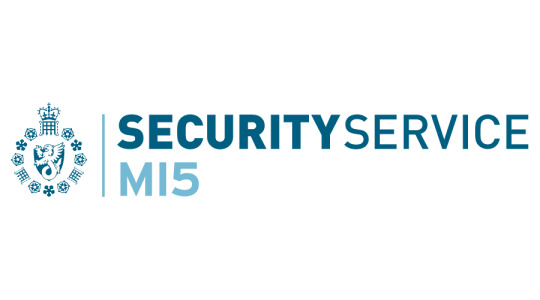
1.- What even?
Whereas MI6 is in charge of gathering intelligence overseas in order to support the government's security, defense, foreign and economic policies, according to the 1989 Security Service Act, MI5 is tasked with "the protection of national security and in particular its protection against threats such as terrorism, espionage and sabotage, the activities of agents of foreign powers, and from actions intended to overthrow or undermine parliamentary democracy by political, industrial or violent means". Such threats may come from abroad or from within.
MI5’s headquarters are found at Thames House, a Grade II (of special interest, warranting every effort to preserve it) building close to the Houses of Parliament in London. In addition to this, there are 8 regional offices in Luton, Wales, Bristol, Glasgow, Manchester, Liverpool, Leeds and Birmingham, as well as another headquarters in Northern Ireland.
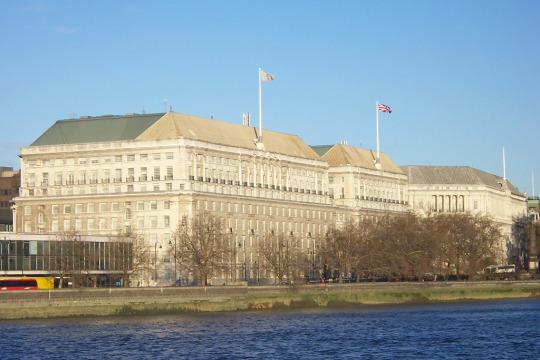
2.- Who is who?
I'm sorry to be the bearer of bad news, but there is no M or C here.
The agency is under the authority of the Home Secretary, even though it does not form part of the Home Office.
The Director General (or DG) is the head of MI5, and is responsible for overseeing its operations and efficiency, reporting back to the Home Secretary and the Prime Minister, as well as ensuring the agency remains politically impartial.
There are 10 branches in MI5, and several entities that support its work, like the National Protective Security Authority (NPSA: providing organizations with security advice) and the Joint Terrorism Analysis Centre (JTAC: handles intelligence relating to international terrorism).
It is worth mentioning that in 2011, His Majesty, King Charles III became the Royal Patron of the Intelligence Services (including MI5, SIS and GCHQ). This means that he receives regular security briefings, as well as a daily ‘red box’ which includes intelligence reports, Cabinet papers, and confidential reports from Commonwealth countries.
There are over 5,000 employees in the organization and their roles include, investigations, technology, languages, surveillance, communications, information, protective security, administrations, building services and catering. As in MI6, all employees must be British, over the age of 18, and UK residents. They aren't allowed to discuss their application or job either.
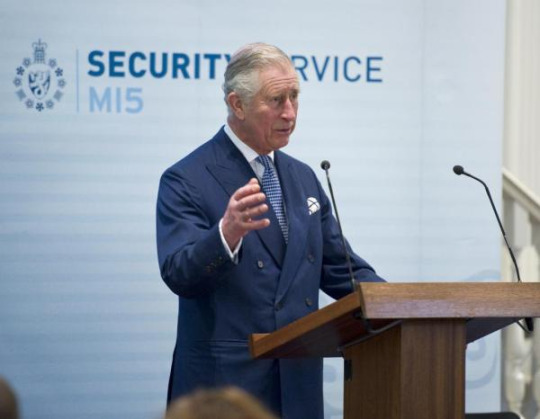
3.- Operational Areas
MI5 mainly focuses on 4 areas: Terrorism, Espionage, Cyber Threats and the Proliferation of Weapons of Mass Destruction.
Counter-Terrorism
The agency focuses on different types of terrorism:
International terrorism: Groups such as ISIL and Al Qaeda.
Northern Ireland related: Dissident republican groups.
Right Wing Terrorism (RWT)/ Left, Anarchist and Single-Issue Terrorism (LASIT): This issue took primacy in 2020 and are handled just like international terrorism.
Counter-Espionage
Seeks to stop foreign intelligence agents from obtaining information and provides security advice to companies and organizations while working closely with MI6, GCHQ, Scotland Yard, as well as security and intelligence organizations abroad.
Cyber
Focuses on hostile actors, such as criminals, "hacktivist" groups, terrorists and foreign states, which are generally well equipped for cyber espionage and computer network attacks. These actors can target the government, the military, businesses, individuals and large volumes of sensitive data.
Cyber Espionage is called Computer Network Exploitation (CNS), while the use of malicious software against cyber infrastructure is denominated Computer Network Attack (CNA).
Counter-Proliferation
The UK is obliged by several international treaties and conventions to work against the threat that weapons of mass destruction pose. MI5 focuses on regimes and states that pursue clandestine weaponization programmes. To do this, the agency works with both private institutions and government agencies such as: The Department for Business, the Innovation and Skills (BIS), the Foreign and Commonwealth Office (FCO), the Ministry of Defence (MOD), His Majesty's Revenue and Customs (HMRC), the Home Office and the National Crime Agency (NCA).
4.- Tale as old as time...
We have talked about the “armed peace” period and how crazy the world was getting back in 1909, basically racing towards THE war everyone thought would put an end to all wars. It was back then that, fearing the German imperialistic ambitions, Great Britain established the Secret Service Bureau through Prime Minister Asquith’s Committee of Imperial Defence.
Initially, this agency handled both national and foreign affairs, under the leadership of 50 year-old Royal Navy Commander Mansfield Cumming and 36 year-old Army captain Vernon Kell.
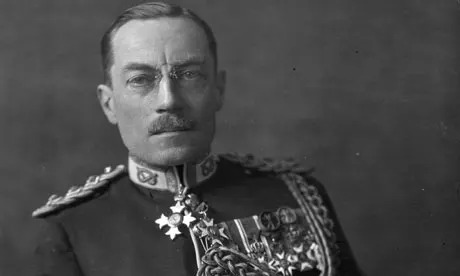
However, down the road, our dear Commander Cumming advocated for the splitting of these branches and thus, the Secret Intelligence Service (MI6) and the Security Service (MI5) were born.
Right off the bat MI5 was tasked with dealing with a massive German espionage network that, according to “official” reports, had infiltrated Britain, causing widespread paranoia. The agency barely had 16 employees back then, but that, along with Churchill’s support (Home Secretary back then) was enough to find out about the existence of a German Naval Intelligence spy network. By the end of WWI, more than half the spies sent to Britain were caught by MI5.
However, the agency barely made it through the post-war cuts, not to mention its rivalry with Scotland Yard’s Special Branch and MI6 (the line between espionage and counter-espionage was REEEEEEAAAALLY thin and they were stepping on each other's toes).
Thankfully, the Soviet Union came to save the day when one of MI5’s surveillance operations revealed that Scotland Yard had been infiltrated by Soviet intelligence. By 1931, MI5 was completely in charge of counter-subversion operations, a responsibility that the agency would continue to hold until 1991.
In the 1970s, terrorism became a priority for MI5, especially those threats coming from Northern Ireland and Qadhafi's Libya, and after the 9/11 attacks, the agency changed its modus operandi entirely.
As you can see, the agency has had a very long history, however, its existence was only officially acknowledged in 1992.
5-. A rose by any other name...
The agency, just like MI6, has taken on many names throughout the years, starting with the Home Section of the Secret Service Bureau in 1909, the Directorate of Military Operations section 5 “MO5(g)” in 1914, Military Intelligence section 5 (MI5) in 1916, the Defence Security Service in 1929, and finally, the Security Service in 1931. And although the latter has remained its official name, the agency is most commonly referred to as MI5, even by those in it.
6.- Technicalities
As it turns out, MI5 shares its funding with MI6 and the GCHQ (no wonder they’re rivals...). According to a report from the 2018/19 period, MI5 used 67% of its budget for international counter-terrorism, 20% for Northern Ireland-related terrorism, and 13% for counter-espionage, counter-proliferation and protective security.
Also worth mentioning, while MI5 agents have plenty of powers, they are not authorized to make arrests, and that is why they work with the Metropolitan Police AKA Scotland Yard, providing them with the necessary intelligence.
Recently, reforms have been made within the agency, and people now have the right to find out the kind of information that MI5 has on them, as well as ask if a deceased relative used to work for the agency. If the relative is still alive, however, MI5 definitely won’t spill the beans. So uhm... you might want to wait a little before trying to find out what that weird uncle does.
7.- Intelligence
MI5 makes use of several techniques to gather intelligence, such as:
Covert Human Intelligence Sources: Also known as “agents”, these people provide secret information during investigations and are NOT MI5 employees.
Directed surveillance: Following and/or observing targets.
Interception of communications: Monitoring emails or phone calls.
Bulk personal data: information about a large number of people used to identify a subject of interest.
Intrusive surveillance: Eavesdropping devices in homes or cars.
Equipment interference: Covertly accessing computers or other devices.
And in case you were wondering, yep, these are all legal because guess what? Individual rights can often be voided when it comes to national security.
Well...
That was all on my behalf. I hope this turned out to be useful for you, and if you happen to have any more doubts on this or any other related topic, my ask is always open!
Yours truly,
-The Internationalist
#writing advice#writing help#creative writing#spies#writing community#writing resources#writing tips#MI5#spooks#writing spies
41 notes
·
View notes
Photo





the international relations students
a map of the world unrolled across your desk
fingertips stained with newspaper ink
wanting to see the world, and even more so, to understand it
walking down a crowded sidewalk, a sense of purpose evident in each step
the hustle and noise of a big city at all hours
a sunrise that greets you when you’ve already been up working for hours
getting used to the feeling of jet lag
analyzing current political tensions
a fascination with history, politics, and economics
eagerly debating the correct course of action in any number of complex international situations
studying the main theories of realism, liberalism, and constructivism
postcards from across the globe pinned up on your wall
the satisfaction of a good debate, where both parties are forced to adjust their viewpoints for the sake of compromise
being able to identify every country on a map
understanding complicated power dynamics on the global scale
staying updated on current events
a sense of wanderlust
the constant desire to learn more and understand more about the world
memorizing national flags, just for fun
refusing to be daunted by difficult or complicated situations
learning the tactics of diplomacy
737 notes
·
View notes
Text
Intelligence agencies 101: MI6
Dashing spies and deadly agents, from James Bond to Alex Rider and George Smiley. We have all heard of British Intelligence, but just how much do you know about MI6?
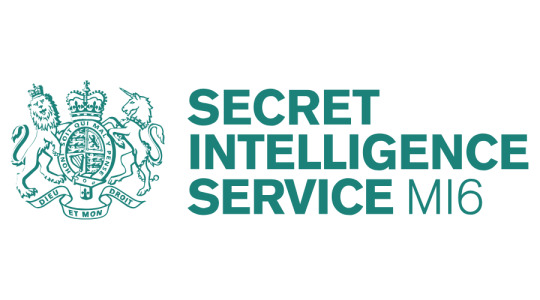
1.- It is the oldest secret service in the world.
If we want to get technical, spies have been working for the British crown since 1569, thanks to Queen Elizabeth I and her Secretary of State, Sir Francis Walsingham. But for now, we'll focus on the contemporary Secret Service.
Hear me out, back in 1909 in the midst of what we call the "armed peace", things were getting anything but peaceful. Countries developed and accumulated weapons like it was a sport, and most of them were unsatisfied with the territories they owned. Germany was going all Queen and screaming "I Want It All", which made the rest of the European countries slightly concerned by its imperialistic ambitions.
Britain was the first to grow paranoid and so Prime Minister Asquith decided to have the Committee of Imperial Defence, create a Secret Service Bureau.
However, it is worth mentioning that the existence of the agency wasn't formally acknowledged until 1994, under the Intelligence Services Act, and even though everyone had known about it for ages.
2.- They have very... diverse tasks
Officially, MI6 is tasked with the collection, analysis, and adequate distribution of foreign intelligence (it is a common misconception that MI6 also handles national affairs, that's what its counterpart MI5 is for).
Now, note that I said "officially", and that is because unofficially (it is kind of very illegal), MI6 has been known to carry out espionage activity overseas. But you already knew that, didn't you? Otherwise, why would you be here?
3.- Roles
As described by the SIS itself, there are several roles within the organisation:
Intelligence officers: Must be UK nationals of at least 18, with no drug use and pass a very intrusive security clearance. The jobs are divided into the following subcategories:
Operational Managers: planning and managing intelligence collection operations.
Targeters: turning information (data) into human intelligence operations.
Officers: link to Whitehall (government) as well as validating and testing intelligence.
Case Officers: managing and building relationships with agents.
Operational Data Analysts: Must be UK nationals of at least 18, with no drug use and pass a very intrusive security clearance. Tech abilities are a must. Training course lasts 2 years.
Tech Network Area: Must be UK nationals of at least 18, with no drug use and pass a very intrusive security clearance. Skills in: GoLang, gRPC, Protobuf, Kubernetes & Docker Python, Java, C#, C, C++, and React (+Redux).
Language Specialists: Must be UK nationals of at least 18, with no drug use and pass a very intrusive security clearance. Russian, Arabic and Mandarin linguists are the most solicited, followed by translators.
4.- Their alphabet is a bit jumbled up
Anyone that has ever seen or read any 007 material knows that M is the head of MI6, whether that be Judy Dench, Bernard Lee or Ralph Fiennes.
But what if I told you that the head of MI6 is actually a certain C?
Back when the Secret Service Bureau was created, a 50-year-old Royal Navy officer called Mansfield Cumming (and dubbed "C") was chosen to head the Foreign Section.
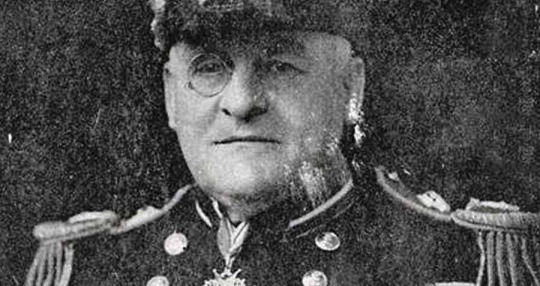
5.- MI6 or SIS?
Officially, the agency's current name (adopted in 1920) is Secret Intelligence Service, hence the acronym SIS, but it wasn't always that. We've established that it started its days as the Secret Service Bureau, and during WWI, the agency joined forces with Military Intelligence, even going as far as to adopt the cover name "MI1(c)".
The agency continued to acquire several names throughout the years, such as "Foreign Intelligence Service", "Secret Service", "Special Intelligence Service" and even "C's organisation". It wasn't until WWII started, that the name MI6 was adopted, in reference to the agency being "section six" of Military Intelligence.
And I truly do hate to be the bearer of bad news but... the name MI6, as cool as it sounds, is no longer in use. Writers and journalists still use that name, but those within the organisation just call it SIS nowadays.

6.- They are fond of their traditions
Remember our dear Commander Mansfield? Well, turns out he started a thing. The man used to sign his letters in green ink and always with the letter "C" a tradition that proved to be sticky enough to be passed down to every single Chief afterwards. Another tradition worth mentioning, is that of calling intelligence reports "CX reports", which... you guessed it, is still done to this day.

7.- Special friends
On 1949, the SIS began a formal collaboration with the CIA, even though the agency had already helped to train their predecessor's personnel, the U.S. Office of Strategic Services.
Even the CIA has admitted that the MI6 has provided them with some of the most valuable information of all time, including information that helped during the Cuban Missile Crisis and key elements to the capture of Osama Bin Laden.

I hope this will be of some use to your future writings and do feel free to submit an ask if you happen to have a specific question regarding British intelligence, or any other International Relations subject!
Yours truly,
–The Internationalist
#writing advice#writing help#writing community#writing tips#writing resources#creative writing#james bond#george smiley#alex rider#mi6#spies
427 notes
·
View notes
Text
Intelligence 101
Writing a story about spies and international intrigue? Not sure what you're diving into? Let me help!
Let's start with the basics.
What is Intelligence?
Basically, "intelligence" refers to the information gathered by governments or institutions that might help guide their course of action. However, there are many types of intelligence depending on how it was obtained, its purpose and the subject:
Human Intelligence: The word says it, intelligence obtained from human sources, generally during covert operations. Whether or not it is relevant depends on the operative's skills within their field of action.
Political Intelligence: Makes use of open-source reports provided by diplomatic personnel, particularly military attachés. Helps foresee the behavior of a country's political forces abroad. It's the least reliable source of information but the parts regarding military organization are the most sought after. Ironically, they're more accesible during war than when in peace.
Economical Intelligence: The collection of information on trade, finances, natural resources, industrial capacities, etc.
Technological Intelligence: Relating to the creation, development and improvement of methods of access and protection of information.
Strategic Intelligence: In charge of gathering information regarding the capacities and intentions of other countries. Includes covert operations beyond the borders, development and maintenance of special and secret diplomatic relations are included here.
Tactical Intelligence: Otherwise known as "operational" or "of combat". It has military purposes and is mainly used in times of war or international tension.
Counterintelligence: In charge of protecting a country's own intelligence systems against foreign ones.
Signal Intelligence (SIGINT): Obtained by the interception and decoding of encrypted messages.
Electronic Intelligence (ELINT): Includes remote sensors such as motion, sound and traffic ones placed in strategic spots in other countries to learn about their capabilities.
False Intelligence: Makes use of deception, disinformation, subversion and double agents.
Images Intelligence (IMINT): Videos, aerial and satellite information. Nowadays they play a vital part in the gathering of strategic information.
Now that we have dipped our toes into the intricate world of espionage things should start to seem clearer. I hope this has helped you and if you would like more information on the subject of Intelligence do stay tuned.
If you have any specific questions, feel free to submit an ask and i will do my best to help!
#writing tips#writing resources#writing help#writing advice#writing community#MI6#CIA#DGSE#spies#james bond#007#mission impossible#bourne
361 notes
·
View notes
Text
all the dialogue tags you'll ever need
said
mutter
groaned
grumbled
clarified
screeched
mumbled
murmured
clarified
scolded
reprimanded
begged
retorted
replied
blurted
confirmed
protested
laughed
exclaimed
disclaimed
agreed
relented
babbled
gushed
chortled
rambled
declared
shrieked
recalled
grunted
concluded
realized
consoled
offered
noted
rasped
spat
whined
cried
proposed
assented
jabbed
sneered
hissed
moaned
demanded
cajoled
insisted
lamented
sneered
glowered
cried
wailed
breathed
ordered
boomed
promised
swore
cursed
gasped
chimed (in)
threatened
warned
questioned
queried
quipped
6K notes
·
View notes
Text
I always found the 7 act structure helped me a lot more than the 3 acts.
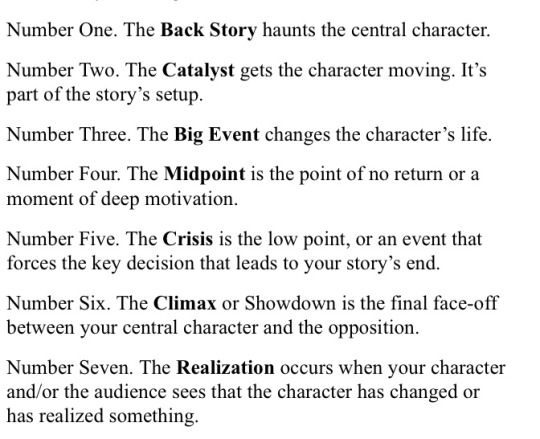
Link right here
14K notes
·
View notes
Text
Hey there!
Welcome to my blog! I'm here to help you sort out all those tricky doubts that come when writing about complicated topics.
This blog will deal with topics relating to:
International Politics
Human Rights
International Law
Diplomacy and Protocol
International Security
Foreign Policy
International History
International Organizations
Conflicts
Peace
Terrorism
Intelligence
Negotiation
Etc.
If you come across any doubts relating to these topics in your writing, feel free to submit a question and I will gladly do my best to help you out.
Sincerely,
-The Internationalist
31 notes
·
View notes

